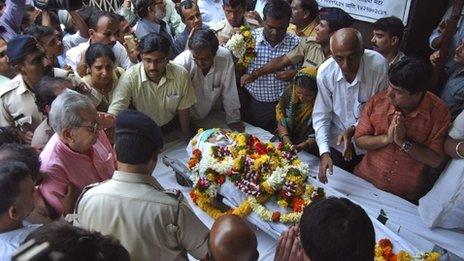Narendra Dabholkar: India's Maharashtra state bans black magic after killing
- Published

The Indian state of Maharashtra has enacted emergency laws banning black magic and superstition, one day after a prominent campaigner was killed.
Anti-superstition activist Narendra Dabholkar, 71, who campaigned for the law, was shot dead in the city of Pune on Tuesday by unidentified gunmen.
Many businesses closed to protest against his killing and chanting demonstrators marched through the city.
He spent decades campaigning against what he called "fraudulent" practices.
Critics accused him of being anti-religion in a country where mysticism and spirituality is venerated.
But in an interview with the Agence France-Presse news agency two years ago he rejected such charges.
"In the whole of the bill, there's not a single word about God or religion. Nothing like that. The Indian constitution allows freedom of worship and nobody can take that away," he said.
"This is about fraudulent and exploitative practices."
Law rushed through
On Thursday, the Maharashtra state government enacted an ordinance to ban rituals, superstition and black magic. However a bill must still be endorsed by the parliament or this legislation will lapse.
The bill that Mr Dabholkar was campaigning for had been approved by the cabinet but lapsed before it could be put to a vote - it had been on a waiting list for eight years.
After his murder, the government rushed through emergency legislation which, according to local media reports, makes it an offence to exploit people by offering rituals, charms and magical cures, and to practice black magic.
Mr Dabholkar and his committee, the Maharashtra Andhashraddha Nirmoolan Samiti (Committee for the Eradication of Blind Faith), was particularly well-known for openly criticising some of India's so-called "godmen", the self-styled Hindu ascetics who claim to perform miracles and are revered by many.
He also campaigned against animal sacrifices used in certain rituals.
- Published20 August 2013